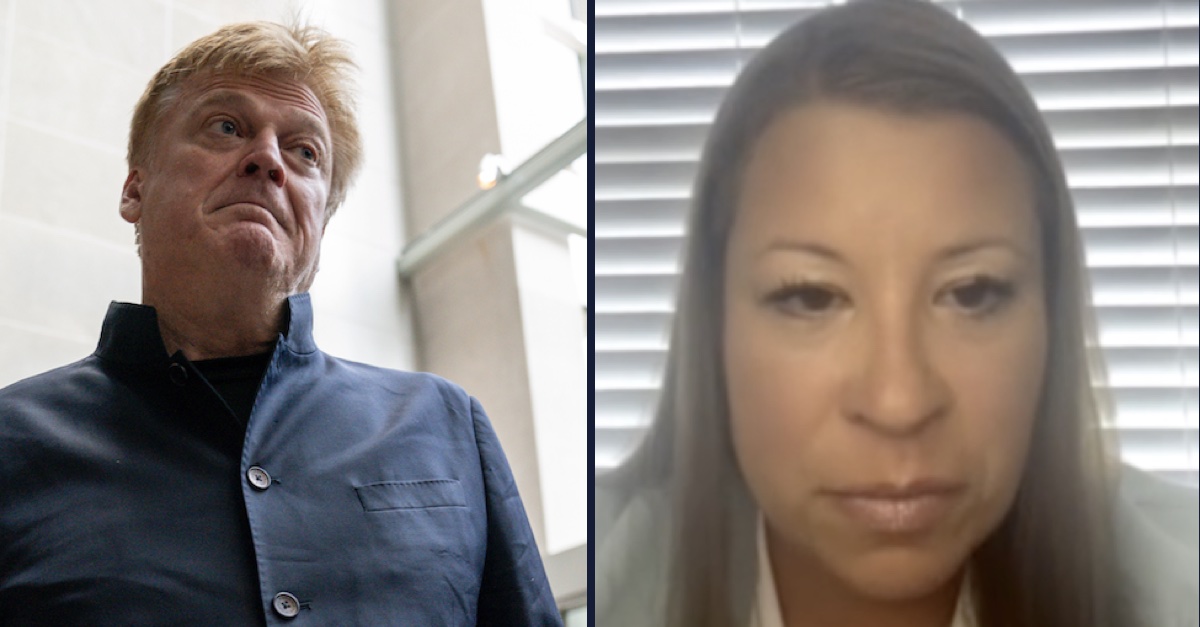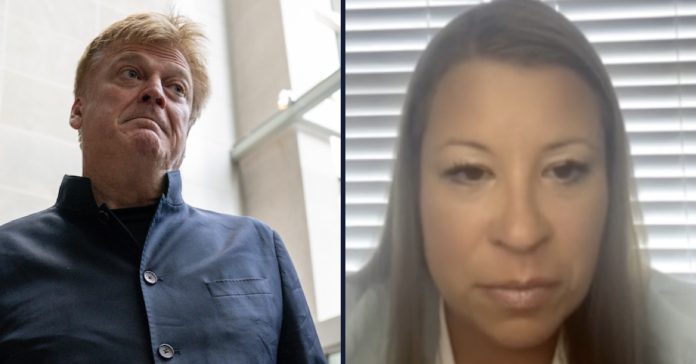
Patrick Byrne (AP Photo/J. Scott Applewhite),Stefanie Lambert (ConservativeDaily podcast/screengrab)
After Dominion Voting Systems moved to disqualify her from the case due to a discovery leak of the company’s emails, an indicted Michigan “Kraken” lawyer is trying to lift a protective order that’s been in place for nearly a year.
Stefanie Lambert and her client, ex-Overstock CEO Patrick Byrne, on April 3 first filed a sealed motion with exhibits attached. The next day, the filing was rejected for running afoul of local rules [see: 5.1(h)]. Two days after that, the duo sought the court’s permission to file under seal a motion to lift the protective order that U.S. District Judge Carl Nichols, a Washington, D.C.-based Donald Trump appointee, put in place back on June 16, 2023.
“Comes now Defendant, Patrick Byrne, by and through undersigned and pursuant to Local Rule 5.1(h), hereby files this Motion for Leave to File a Motion to Lift the Protective Order applicable to this case (Docket Entry No. 46) (Attachment 1), under seal per this Court’s ‘Minute Order’ issued on Thursday, April, 4, 2024, and also pursuant to this Court’s prior instructions in the aforementioned protective order,” the Saturday filing said, noting that Dominion’s lawyers oppose the motion.
The April 4 order that initially denied the sealed motion without prejudice based on non-compliance with a local rule indicated that the filing was related to Dominion’s March 15 emergency motion to disqualify Lambert, who only recently entered the case as Byrne’s lawyer and promptly found herself in hot water.
In March, Dominion said that Lambert and Byrne’s leak appeared to deliberately give a 2020 election-denying sheriff “username-and-password access” to “more than 1 million documents” of discovery, which the plaintiff said should lead to disqualification and possible sanctions.
Dominion said it learned about the discovery “breach” on March 12 from Byrne’s then attorney Robert Driscoll, who emailed Dominion to say that Lambert shared discovery with non-party Barry County Sheriff Dar Leaf and that Lambert filed discovery material in her criminal case.
After Lambert traveled to D.C. to represent Byrne following the leak, she was arrested and spent a night in jail for failing to appear in Michigan court on March 7 to face her felony indictment for an alleged conspiracy to gain unauthorized access to and willfully damage voting machines. After her release, Lambert responded by driving home, turning herself in, and submitting to fingerprinting and the collection of a DNA sample in Oakland County. She was booked and released from jail a second time.
Lambert has said that Byrne “directed” her to violate the protective order and she justified the leak by saying she forwarded evidence of 2020 election “criminal activity” to law enforcement, according to court documents filed by Dominion.
In defense of her actions, Lambert said discovery included emails written in “Serbian and foreign languages” that she claimed were “evidence of criminal violations,” purportedly showing “top level Dominion employees directing and tasking foreign nationals to remotely access voting machines utilized in the United States during the November 3, 2020 election.”
Dominion, for its part, criticized Lambert and Byrne for drawing the “xenophobic conclusion” that “any email from non-US-based Dominion personnel is conclusive evidence of criminal activity.” The company reiterated that the defendant and his lawyer “continue to promote their false claims about the documents they leaked” even after a magistrate judge “orally ordered” them on March 18 to “maintain the status quo during the pendency of this Court’s consideration of this issue [.]”
The plaintiff maintained that “nothing short of Lambert’s disqualification will preserve the integrity of this proceeding.”
Have a tip we should know? [email protected]

